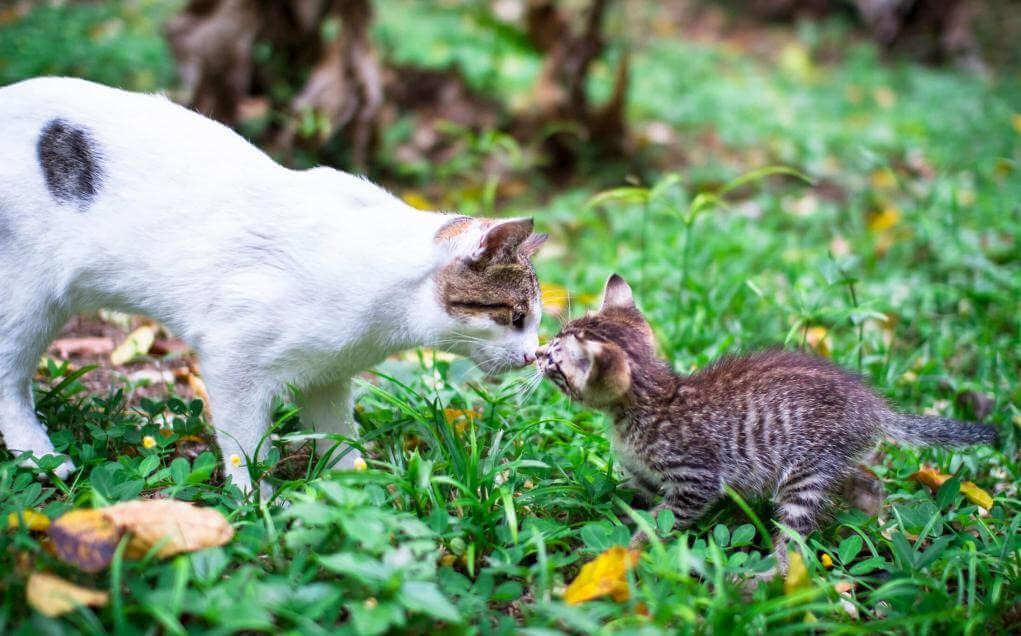
If you don’t neuter your female cat, there’s a good chance she will find a male cat to mate with and become pregnant, especially if you live in a busy, cat-filled neighbourhood. If your cat becomes pregnant, you may be unsure what to do next. In this article, James Wellbeloved offers advice on what to do if your cat is pregnant…
IS YOUR CAT PREGNANT?
The first thing you’ll need to do is make sure your cat is definitely pregnant. Signs of cat pregnancy include:
Enlarged, red nipples (also known as ‘pinking up’)
Vomiting (morning sickness)
Swollen tummy
Weight gain
Increased appetite
More affectionate towards you
However, the only way to be completely sure is to take your cat to the vet, where they will be able to give your cat an ultrasound. Ultrasounds are accurate after day 16 of the conception.
CARING FOR PREGNANT CATS
If your cat is pregnant, you’ll need to take the necessary steps to ensure she is happy and healthy throughout her pregnancy. Firstly, pregnant cats eat more food to keep their calorie intake up. Check that your cat is eating a cat food rich in vitamins and nutrients to give her and her unborn litter the strength they need. From about three weeks into her pregnancy your cat will need a diet formulated for kittens, as it contains the higher nutrient density essential for the energy and nutrient drain that is gestation. You will also need to keep up with your cat’s medical treatments to protect her kittens from any potential issues, including fleas and worms. It is vital to check with a vet before treatment, as some treatments are unsafe to administer during pregnancy. Next, prepare your home for the impending birth. Cats tend to go into nesting mode a couple of weeks before they give birth, so try to find a quiet, secluded spot where your cat will be out of the way of household noise. You could use a cardboard box with a low opening and some old towels or blankets inside and encourage your cat to visit the box regularly so she gets used to the area. However, don’t be surprised if she rejects your special bed for somewhere else – cats give birth where they choose to, and have long been known to give birth under beds or in cupboards! It’s important not to attempt to move her back to the original spot, as this may cause her unnecessary distress.

GIVING BIRTH
Cats are adept at giving birth without need for assistance, but you should be on hand to watch out for danger signs. Labour can last anywhere between two to 24 hours. If you notice your cat struggling, call a vet immediately. Labour should be a fairly simple process, even for first-time mums. Once each kitten is born, the mother should break its amniotic sac, the thin membrane surrounding it, and clean the kitten’s nose and mouth so it can take its first breaths. She should also chew through the umbilical cord herself. If she doesn’t, or seems to be having difficulty, you may need to break the amniotic sac and cut the cord yourself. Always make sure you know how to do this before the birth, or contact a vet for advice. After the kittens are born, leave your cat to clean and feed them. Try to limit noise and visitors for the first couple of days so your cat can rest and bond with her new family. If your cat appears to be neglecting her litter, contact a vet immediately. The best way to ensure a smooth pregnancy is to take your cat for regular vet check-ups throughout to make sure all is well before the big arrival.
POST PREGNANCY OPTIONS
When you know your cat is pregnant, it’s time to decide what to do with her kittens after she has had them. Cats usually have between four to six kittens, but an X-ray at the vet may be able to tell you how many kittens to expect. Some people decide to keep one or two kittens from the litter and give the rest away to friends or family, while some decide to sell them via advertisements. Others give kittens up for adoption. If you decide to go with either of these options, you will need to give the kittens all necessary vaccinations and treatments before they go to their new homes. Check with a vet what you need to do if you are unsure. You should also evaluate who you give your kittens to – the kittens’ health and happiness is your top priority and you want them to go to a kind, loving home.

Related Articles








